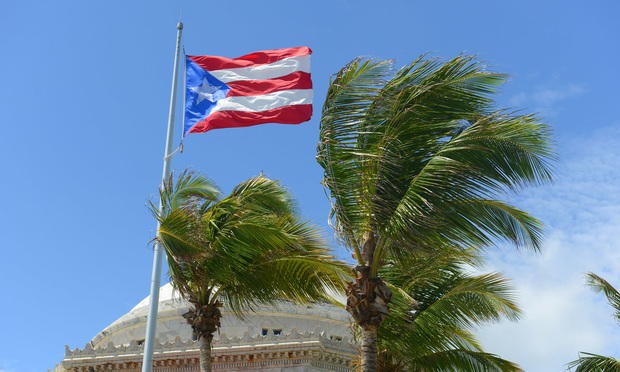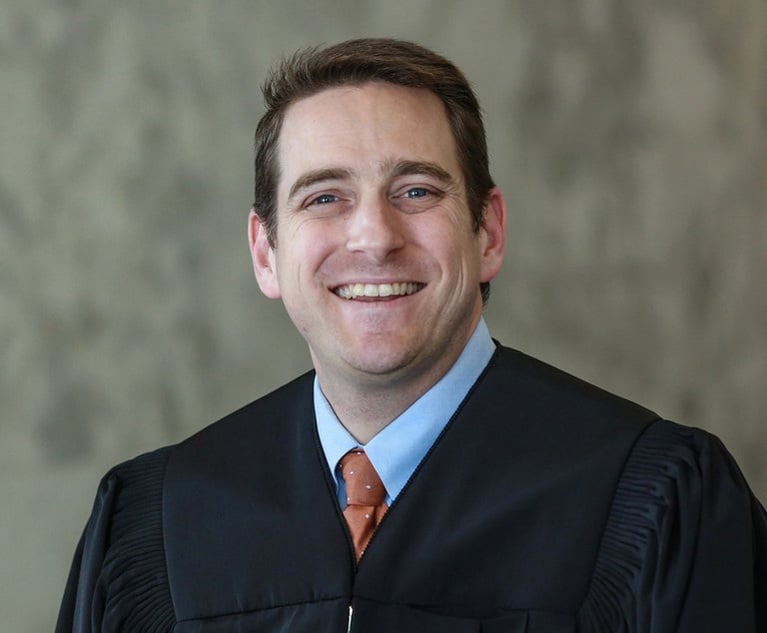Daily Dicta: The Docket That Ate the Am Law 100
The latest skirmish in the $120 billion Puerto Rico debt restructuring provides a window into the intense--and truly enormous--litigation.
July 09, 2019 at 02:02 PM
4 minute read
 Flag of the Commonwealth of Puerto Rico in front of Capitolio, San Juan, Puerto Rico.
Flag of the Commonwealth of Puerto Rico in front of Capitolio, San Juan, Puerto Rico.
Litigators sometimes describe their most intense cases as “drinking from a fire hose.” But the $120 billion Puerto Rico debt restructuring—that's no fire hose. It's Niagara Falls.
Consider that as of yesterday, the docket for the lead case in Puerto Rico federal court has had 7,860 entries in the last 26 months. That's an average of 10 filings a day, 365 days a year.
And that's not counting nearly 300 associated cases—by unsecured creditors, insurers, pensioners, bondholders, hedge funds, as well as actions to recover money that the commonwealth previously paid government contractors. There's a U.S. Supreme Court case set to be argued in October as well.
It's the docket that ate the Am Law 100—seriously, what firm doesn't have a piece of the action? We're talking Proskauer Rose; O'Melveny & Myers; Paul Hastings; Jenner & Block; Gibson, Dunn & Crutcher; Weil Gotshal; Milbank; Munger Tolles; Cadwalader; Jones Day; Brown Rudnick; White & Case; Skadden; Robbins Russell; Quinn Emanuel; Wachtell; Dechert … The list goes on.
 The latest skirmish flared up over the holiday weekend, pitting the Financial Oversight and Management Board for Puerto Rico—which was created by Congress to oversee the commonwealth's finances—and its counsel from Proskauer against the governor of Puerto Rico and his legal team from O'Melveny & Myers.
The latest skirmish flared up over the holiday weekend, pitting the Financial Oversight and Management Board for Puerto Rico—which was created by Congress to oversee the commonwealth's finances—and its counsel from Proskauer against the governor of Puerto Rico and his legal team from O'Melveny & Myers.
It's one battle in a much larger war, but it provides a window into just how fast-moving and intense the litigation can be.
The Proskauer litigation team led by Timothy Mungovan and Martin Bienenstock on July 3 sued Governor Ricardo Antonio Rosselló Nevares and the Puerto Rico Fiscal Agency and Financial Advisory Authority, objecting to a series of new laws that would allegedly siphon off hundreds of millions of dollars from the oversight board's carefully crafted fiscal plan.
The board, they noted, was intended by Congress to be “an apolitical body to make hard and sometimes unpopular fiscal plan and budgetary decisions which commonwealth governments had not made.”
In other words, the board is the bad cop. But when you're saddled with “severe economic decline, operating deficits, lack of financial transparency, management inefficiencies and excessive borrowing,” someone has to make the tough calls to get things in order.
Except the Puerto Rico legislature and governor threw a wrench in the board's plans, enacting what's known as Law 29 on May 17. According to the board, the law essentially eliminates the obligation of Puerto Rico's municipalities to reimburse the commonwealth for their pension costs. It also exempts municipalities from paying their contribution to the commonwealth's health insurance program.
The legislation will allegedly cost the commonwealth about $311 million for fiscal year 2020, and $1.7 billion through fiscal year 2024—an obligation that the Proskauer team says undermines the board's whole purpose and mandate.
But the powers of the board are running up against Puerto Rico's sovereignty, and the right of democratically elected leaders to make spending decisions. In public remarks, the governor said the board's pension cuts “constitute[] an attack on everyone in Puerto Rico,” and suggested that the board “want[s] to go to the courts to run over the people of Puerto Rico, to usurp them.”
The case is before U.S. District Court Judge Laura Taylor Swain in the Southern District of New York. On Sunday, she fast-tracked the motion for declaratory and injunctive relief, with oral arguments scheduled for Aug. 2.
This content has been archived. It is available through our partners, LexisNexis® and Bloomberg Law.
To view this content, please continue to their sites.
Not a Lexis Subscriber?
Subscribe Now
Not a Bloomberg Law Subscriber?
Subscribe Now
NOT FOR REPRINT
© 2025 ALM Global, LLC, All Rights Reserved. Request academic re-use from www.copyright.com. All other uses, submit a request to [email protected]. For more information visit Asset & Logo Licensing.
You Might Like
View All
Litigators of the Week: Simpson Thacher and ACLU Team To Challenge Louisiana's Ten Commandments Law

A Reporter and a Mayor: Behind the Scenes During the Eric Adams Indictment News Cycle

Even With New Business Courts, Texas Is a Long Way from Taking Delaware's Corporate Law Mantle
5 minute readTrending Stories
- 1'A Waste of Your Time': Practice Tips From Judges in the Oakland Federal Courthouse
- 2Judge Extends Tom Girardi's Time in Prison Medical Facility to Feb. 20
- 3Supreme Court Denies Trump's Request to Pause Pending Environmental Cases
- 4‘Blitzkrieg of Lawlessness’: Environmental Lawyers Decry EPA Spending Freeze
- 5Litera Acquires Workflow Management Provider Peppermint Technology
Who Got The Work
J. Brugh Lower of Gibbons has entered an appearance for industrial equipment supplier Devco Corporation in a pending trademark infringement lawsuit. The suit, accusing the defendant of selling knock-off Graco products, was filed Dec. 18 in New Jersey District Court by Rivkin Radler on behalf of Graco Inc. and Graco Minnesota. The case, assigned to U.S. District Judge Zahid N. Quraishi, is 3:24-cv-11294, Graco Inc. et al v. Devco Corporation.
Who Got The Work
Rebecca Maller-Stein and Kent A. Yalowitz of Arnold & Porter Kaye Scholer have entered their appearances for Hanaco Venture Capital and its executives, Lior Prosor and David Frankel, in a pending securities lawsuit. The action, filed on Dec. 24 in New York Southern District Court by Zell, Aron & Co. on behalf of Goldeneye Advisors, accuses the defendants of negligently and fraudulently managing the plaintiff's $1 million investment. The case, assigned to U.S. District Judge Vernon S. Broderick, is 1:24-cv-09918, Goldeneye Advisors, LLC v. Hanaco Venture Capital, Ltd. et al.
Who Got The Work
Attorneys from A&O Shearman has stepped in as defense counsel for Toronto-Dominion Bank and other defendants in a pending securities class action. The suit, filed Dec. 11 in New York Southern District Court by Bleichmar Fonti & Auld, accuses the defendants of concealing the bank's 'pervasive' deficiencies in regards to its compliance with the Bank Secrecy Act and the quality of its anti-money laundering controls. The case, assigned to U.S. District Judge Arun Subramanian, is 1:24-cv-09445, Gonzalez v. The Toronto-Dominion Bank et al.
Who Got The Work
Crown Castle International, a Pennsylvania company providing shared communications infrastructure, has turned to Luke D. Wolf of Gordon Rees Scully Mansukhani to fend off a pending breach-of-contract lawsuit. The court action, filed Nov. 25 in Michigan Eastern District Court by Hooper Hathaway PC on behalf of The Town Residences LLC, accuses Crown Castle of failing to transfer approximately $30,000 in utility payments from T-Mobile in breach of a roof-top lease and assignment agreement. The case, assigned to U.S. District Judge Susan K. Declercq, is 2:24-cv-13131, The Town Residences LLC v. T-Mobile US, Inc. et al.
Who Got The Work
Wilfred P. Coronato and Daniel M. Schwartz of McCarter & English have stepped in as defense counsel to Electrolux Home Products Inc. in a pending product liability lawsuit. The court action, filed Nov. 26 in New York Eastern District Court by Poulos Lopiccolo PC and Nagel Rice LLP on behalf of David Stern, alleges that the defendant's refrigerators’ drawers and shelving repeatedly break and fall apart within months after purchase. The case, assigned to U.S. District Judge Joan M. Azrack, is 2:24-cv-08204, Stern v. Electrolux Home Products, Inc.
Featured Firms
Law Offices of Gary Martin Hays & Associates, P.C.
(470) 294-1674
Law Offices of Mark E. Salomone
(857) 444-6468
Smith & Hassler
(713) 739-1250







